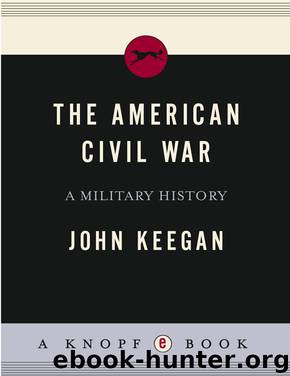The American Civil War by John Keegan

Author:John Keegan [Keegan, John]
Language: eng
Format: epub, mobi
ISBN: 978-0-307-27314-7
Publisher: Knopf Doubleday Publishing Group
Published: 2009-03-24T16:00:00+00:00
Everything from the start had promised a different outcome. Hooker had outnumbered Lee two to one; Lee had several times weakened himself by dividing his army in the face of the enemy. Hooker, though, simply by loss of nerve and failure to understand Lee’s movements, had thrown away any advantage. Even at the very end, when he had announced his failure by withdrawing his army across the Rappahannock, he enabled Lee to achieve one more victory, by allowing Sedgwick, whom he had sent to Fredericksburg, to fight unsupported at Salem Church on May 3-4. Sedgwick then followed the rest of the army in retreat across the Rappahannock. Hooker’s judgement on his lamentable performance proclaimed the self-justification of a weak incompetent. “My army was not beaten. Only a part of it had been engaged. My First Corps … was fresh and ready and eager to be brought into action, as was my whole army. But I had been fully convinced of the futility of attacking fortified positions and I was determined not to sacrifice my men needlessly, though it should be at the expense of my reputation as a fighting officer.”3 This was disingenuous. The Chancellorsville position was not fortified, except by the difficulty of the Wilderness itself and by hasty entrenchments and obstacles. In any case, Hooker sacrificed what reputation he enjoyed by declining to fight at times and places where he might have succeeded. Like McClellan, he had thrown away all his advantages for no good reason other than his own timidity.
Hooker’s loss of nerve at Chancellorsville disturbed Lincoln, who spent the first two weeks of May 1863 trying to put backbone into him, when he was not simply trying to establish what the general was doing and intended to do. By May 6 Lincoln had at last learned that a major battle had taken place, resulting in “no success to us” and that the Army of the Potomac had withdrawn to the north bank of the Rappahannock. Holding this telegram communicating the news and showing a face gray with anxiety, he paced about the White House, repeating the words, “My God, my God. What will the country say? What will the country say?” That afternoon, in his distraction, he decided that he must meet and question Hooker, and left at once. When he arrived at the headquarters of the Army of the Potomac, he held a conference of senior officers, whom he disappointed by referring not at all to the battle of Chancellorsville. Nor did he give them an opportunity to recommend Hooker’s removal, though several of the corps commanders wished it. Nevertheless, some of Hooker’s critics discussed making a visit to Washington to put the matter directly to Lincoln, out of sight of their superior, and to suggest his replacement by George Meade, one of the corps commanders. In the event, they desisted, since Meade declined to be nominated.
Lincoln also interviewed Hooker alone, at which time, following his established habit, he gave the general a letter, in which he set out his views and asked the questions to which he needed answers.
Download
The American Civil War by John Keegan.epub
The American Civil War by John Keegan.mobi
This site does not store any files on its server. We only index and link to content provided by other sites. Please contact the content providers to delete copyright contents if any and email us, we'll remove relevant links or contents immediately.
| Afghan & Iraq Wars | American Civil War |
| American Revolution | Vietnam War |
| World War I | World War II |
Waking Up in Heaven: A True Story of Brokenness, Heaven, and Life Again by McVea Crystal & Tresniowski Alex(37808)
Empire of the Sikhs by Patwant Singh(23085)
We're Going to Need More Wine by Gabrielle Union(19046)
Hans Sturm: A Soldier's Odyssey on the Eastern Front by Gordon Williamson(18590)
Leonardo da Vinci by Walter Isaacson(13336)
The Radium Girls by Kate Moore(12028)
Tools of Titans by Timothy Ferriss(8394)
Educated by Tara Westover(8054)
How to Be a Bawse: A Guide to Conquering Life by Lilly Singh(7486)
Permanent Record by Edward Snowden(5847)
The Last Black Unicorn by Tiffany Haddish(5635)
The Rise and Fall of Senator Joe McCarthy by James Cross Giblin(5280)
Promise Me, Dad by Joe Biden(5153)
The Wind in My Hair by Masih Alinejad(5095)
A Higher Loyalty: Truth, Lies, and Leadership by James Comey(4963)
The Crown by Robert Lacey(4814)
The Iron Duke by The Iron Duke(4354)
Joan of Arc by Mary Gordon(4110)
Stalin by Stephen Kotkin(3965)
